
PAST INITIATIVES
OUR ORIGIN
Operating since 1980, IGE has a long history of service.
The Institute of Global Education (IGE) was founded in 1980 as a non-profit organization. In March of 1984, the IRS granted IGE tax-exempt status, and in June of 1998 the United Nations Economic and Social Council granted IGE “Special Consultative Status”.
The work of IGE has always been education with a worldwide perspective.


PAST INITIATIVES
UNITED NATIONS ACTIVITIES
IGE was granted special consultative status with the United Nations Economic and Social Council (ECOSOC) in 1998.
IGE applied for membership on the Council in order to have a closer working relationship with the international community and because we thought our background and experience, particularly through Radio for Peace International, working with Indigenous peoples and our efforts to support education for marginalized youth in India would be helpful in the work of the Council.
At a meeting of the Council the members agreed and voted unanimously in favor of admittance. Since then, IGE has participated in the deliberations and activities of the Council whenever appropriate.
Beginning with the establishment, in 1986, of Radio for Peace International on the Campus of the United Nations University for Peace, in Costa Rica, the connection was strengthened through various activities, notably the Indigenous Conferences.

Debra Schneider, IGE Board Member
Visiting United Nations during IGE board meeting
Dr. Bernard Starr, Mitchel Rabin and Richard Schiffman, IGE’s United Nations ECOSOC representatives in New York, closely monitor the activities of the UN and participates when appropriate. They attend relevant meetings and consultations at the UN headquarters and work with agencies both in and outside the UN to strengthen and empower the United Nations in its global mission. Their activities have included representing IGE in the deliberations of the UN’s Economic and Social Council and participating in developing priorities for the UN Aging Program, helping develop a proposal on Elders for Peace and helping to organize interfaith events with a variety of NGOs at the UN.
In 1998, IGE, with support from the United Nations, hosted a conference, in Virginia Beach, called Belonging to Mother Earth, attended by 3,000 participants, including 54 Shamans and Chiefs and many non-indigenous leaders from around the world. The conference helped develop the momentum that led to the formation of the UN Permanent Forum on Indigenous Issues that continues to work for the interests of indigenous people around the world.
In 2014 IGE was joined by the United Nations University for Peace (UPEACE) to host Focus on the Future: Empowering Agents of Change in San Jose, Costa Rica, March 3 and 4th. This conference brought together change agents from around the world who want to make it a better place to live, to work and to be.

Radio for Peace International
Located on the United Nations University grounds in San Jose, Costa Rica
RADIO FOR PEACE INTERNATIONAL
In 1986, IGE expanded its efforts to a worldwide stage by establishing Radio for Peace International through an agreement with the United Nations University for Peace in Costa Rica. Programming included news from around the world, formal courses, and general education. Conferences and interviews of people like the Dalai Lama were covered live and broadcast directly.
The location near the equator allowed shortwave programs to be heard around the world with a relatively small amount of power. RFPI broadcasts focused on peace and disarmament, human rights and the environment.
The first broadcast occurred on September 16, 1987. Programming included news from around the world, formal courses and general education. The United Nations and other sources provided news. Independent organizations, such as New Dimensions Radio and Feminist International Radio Endeavour, provided some courses and other programs. RFPI developed others in-house.
RFPI initiated a number of technical innovations. Conferences and interviews of people like the Dali Lama were covered live and broadcast directly. The station used Internet technology to create web casts and in 2001 established the first shortwave listener to listener communication.
This collaborative relationship was maintained from 1986 until 2003 when RFPI closed due to the advent of the internet and the declining significance of short-wave radio.
In 1992 IGE established the Mucherla Global School in the Indian state of Andhra Pradesh and soon also began assisting numerous surrounding villages in Andhra Pradesh. IGE’s Indian Student Scholarship Program was created in 2003 to further the education of former Mucherla Global School students by assisting them to obtain college and university degrees.
In 2010, IGE extended its work to Northeast India by joining with other educational organizations to form the Meghalaya Global Peace Consortium to promote peace and community development in the region.
In response to the devastation resulting from the Nepal earthquake in 2015 IGE also offered support to Nepal by initiating an Online Education Project to teach English in partnership with the World Service Association. A local organization, UNNAT Nepal was formed to provide support to rural communities and support educational initiatives. IGE continues to support their ongoing efforts.
As a result of a long association with Indigenous Peoples and their issues in North America and around the World, IGE and others realised a better understanding was needed about how diverse cultures could develop mutual respect, understanding and communication with one another. This led to a series of four conferences, that built on one another, with increasing participation by both indigenous and non-indigenous leaders. The conferences contributed to both a growing awareness of the need for and an actual increase in better communication and cooperation among indigenous as well as with non-indigenous peoples.
Peace and the Planet I
In recognition of the need to develop mutual respect, understanding and communication among indigenous groups, IGE hosted this conference in Eugene, Oregon in February 1990. The conference was attended by 192 indigenous and non-indigenous participants from around the World, but primarily from North America. Dennis Weaver, the well-known actor, and Karan Singh, the Indian Ambassador to the United States, both gave keynote addresses and led workshops.
Dennis Weaver had done considerable work at the Self Realization Fellowship and is also known for his various efforts to promote environmental sustainability. In his keynote speech, he asked the question “How can we, as members of a diverse society, move away from wide-spread violence and environmental destruction?” The solution, suggested by Weaver, was to improve respect, understanding and communication among the World’s cultures. Weaver also led a workshop where he and the participants explored the means to move forward.
Ambassador Singh’s keynote speech and workshop also dealt with violence and environmental destruction, using as a case example the Indian-Pakistani conflict Kashmir. In describing the situation, Ambassador Singh said that the only way to resolve the conflict over Kashmir was for the Muslim and Hindu communities to come to a better understanding of and respect for one another’s cultures. Any attempt to resolve the dispute through mere allocation of land would be unsuccessful.
Peace and the Planet II
As a result of Peace and the Planet I, it was clear that further work on developing respect, understanding and communication among diverse cultures was imperative. This led to Peace and the Planet II, also in Eugene, Oregon in March 1991, attended by 220. The keynote address at this conference was provided by Shri Chinmoy, an Indian spiritual master who began teaching meditation in the West when he moved to New York in 1964. At the time of the conference, he was leading the United Nations on the use of meditation in international relations https://www.srichinmoy.org/service/united_nations/. His keynote address and following workshop provided insights and processes on how to improve communication and respect between cultures. At the conclusion of the conference, IGE presented Shri Chinmoy with its World Citizen Humanitarian Award.
Native Wisdom, Native Rights and Mother Earth
In 1992, Native Wisdom, Native Rights and Mother Earth brought together 340 participants. These included Elsa Stamatopoulou, the then United Nations Deputy High Commissioner for Human rights, 58 Chiefs and Shamans and other representatives of indigenous groups from around the world and many non-indigenous leaders. During the conference, indigenous groups shared their ceremonies, cultures, and beliefs. After the conference, to improve the ways in which the American Government treated Indigenous Peoples, nine indigenous groups formed a delegation to the Bureau of Indian Affairs in Washington, D.C.
Belonging to Mother Earth
In 1998, IGE held a fourth, week-long conference, Belonging to Mother Earth, in Virginia Beach, Virginia, attended by 3000 participants. The conference had considerable support from the United Nations and participants included many shamans and chiefs and other indigenous people from almost every continent, many outstanding, non-indigenous leaders and about 1000 students from local schools. Indigenous people shared their cultures, beliefs, ceremonies, and the issues faced by indigenous people, which led to the development of considerable solidarity among the diverse participants.
The momentum created during the conference led to a strong desire to create an ongoing mechanism to foster continued dialogue and cooperation. This momentum was partly responsible for creation of the United Nations Permanent International Forum on Indigenous Issues. The Forum, which meets annually in New York, provides ongoing opportunities for discussion, research and resolution of Indigenous issues and rights around the World.

Entrance to Mucherla Global School
Stating Granny's (Ruth Schneider's) Rules
MUCHERLA GLOBAL SCHOOL
IGE’s work in India began in 1992 with the establishment of the Mucherla Global School in the State of Andhra Pradesh. Mucherla was an extremely poor, rural village, reachable only by a dirt road, impassable in the rainy season. Illiteracy was high, discrimination was rampant, and incomes were low.
With a small grant of $20,000, a plot of land and a couple simple buildings, the school began. Dr. Richard Schneider was primarily responsible for developing funding and other resources. Ruth Schneider, retired teacher, spent 6 months a year in Mucherla and was primarily responsible for day-to-day operations.
However, they worked in close harmony. For instance, Ruth was the primary curriculum developer, but Richard developed the gardening curriculum and integrated it with all the other subjects.
The challenges were huge. At first, not a single student spoke English. However, within a month, all instruction was in English. Instruction included both character development and academic subjects. All students were treated equally, caste was not recognized. Because of their recognition of the value of education, the villagers strongly supported the school, students were highly motivated, and progress was rapid.
As the reputation of the Mucherla Global School, Richard and Ruth and IGE spread, so did their work.
Six years after starting the school, Ruth died unexpectedly. The leaders of Mucherla took over the management of Mucherla Global School and have since built a new school which is still operating today. As students graduated beyond tenth level, IGE supported many of them with college scholarships and living expenses through the IGE Indian Student Scholarship Program, (see below). Some of these graduates had started school with Ruth Schneider at the age of 6 when Mucherla Global School first offered educational programs.
INTERNATIONAL ABORGINAL CONFERENCES
IGE offered numerous workshops by well-known thinkers and activists, such as Barbara Marx Hubbard and Dr. Wayne Dyer. IGE organized four international conferences on aboriginal issues. The first two, titled Peace and the Planet I and II, were held in Eugene, Oregon in 1990 and 1991 and featured actor Dennis Weaver, Ambassador Karan Singh of India, and Sri Chinmoy. The third conference, Native Wisdom, Native Rights, and Mother Earth, in 1991 and in Eugene, Oregon, was attended by leading Aboriginal chiefs and shamans from numerous countries and Elsa Stamatopoulou, Deputy High Commissioner for Human Rights of the UN.
In 1998, at the request of many aboriginal people around the world, IGE hosted a fourth conference on indigenous affairs, Belonging to Mother Earth, in Virginia Beach, Virginia. Participants included 3,000 aboriginal and non-aboriginal people from around the world, 54 leading Shamans and Chiefs and many outstanding non-indigenous leaders.
In addition to hosting workshops, courses and conferences, IGE continued to participate in numerous peace and education retreats, conferences, and projects, worldwide. Through these opportunities, IGE extended its network of individuals working toward abundance through peace and education.


Welcoming "Granny" (Ruth Schneider)
Mucherla Global School - end of July 1998

Parading Through Town
Mucherla Global School

In The Classroom With Colored Pencils
Mucherla Global School
Medical camps were held to treat injuries and illness. Classes and workshops provided education on AIDS and safe sex, inexpensive ways to improve nutrition and ways to avoid dehydration of sick children. Hunger was reduced through the introduction of school snacks and efforts to improve incomes so sufficient food and food of higher nutrition could be purchased. Communication with government agencies was improved through helping with applications for medical assistance and improved roads.
As a result of all these efforts, doctors and other medical practitioners, government representatives and paved roads are now much more prevalent, and the health and well-being of villagers has improved.
In support of these efforts, from 1992 to 2003, IGE provided consultation; recruited volunteers like doctors and teachers; promoted visits by government agencies and paid for food, educational material and transportation. Funds for such activities come from IGE’s budget and so are supported by public donations.
ANDHRA PRADESH VILLAGE OUTREACH
Soon after IGE created the Mucherla Global School in the village of Mucherla, Andhra Pradesh, it became obvious that Mucherla and other rural villages faced problems with medical care, nutrition, water pollution, transportation and communication.
Doctors and other medical practitioners were often not available to deal with even routine issues. Dehydration of sick children was a major cause of death; AIDs education was largely absent; and poor nutrition was common, due to both too little food and choosing food of inadequate nutrition. Water supplies were frequently polluted, which increased water-borne diseases such as dysentery. Usually, the only transportation into and out of the villages was by a rough, dirt road that became nearly impassable during the monsoon season. The difficulty of travel severely limited communication between the villages and the outside world for commerce, education, and government assistance. As a result of these problems villagers were isolated from the outside world, suffered from numerous illnesses and premature deaths were common.
Consequently, in 1992, the Institute of Global Education, through its CEO Dr. Richard Schneider, began consulting with several villages on ways to improve their economic, environmental, and social well-being. During the ensuing years, IGE assisted some 20 villages to resolve numerous problems.

Andhra Pradesh Village Outreach
Program Success
The Program’s success is in the academic progress and social consciousness of its students. Forty students, all low Hindu caste and/or from poor families, obtained degrees or certification at the completion of the program. Many are involved in service projects for the poor or planning to contribute to India’s social, economic, and environmental development through their employment.
Program Finances and Needs
Program expenses include tuition, room and board, school supplies, exam fees, and medical care. Average cost per student, in US dollars, in 2012 was $1,500 and at the completion of the program in 2020 they averaged $5,000 to $6,000. Total annual costs have varied from $30,000 to $50,000 annually. Increases were due to adding students in the early years and to both general inflation (9-15%, annually) and to the higher, relative cost of both education and medical care (about 20%, annually).
The Program was supported through public donations. Some donors choose to sponsor an individual student with whom they often form a close personal connection. Donors received a tax-exempt receipt under provision of the US Internal Revenue Code section 501 (c) 3. All income and expenses were recorded using standard accounting processes and audited once a year.
The Indian Student Scholarship Program family consists of people who believe in the power of dreaming big and that they can make a difference. We have the means to be part of a remarkable revolution in education that may provide the key to improving conditions in rural areas around the World.
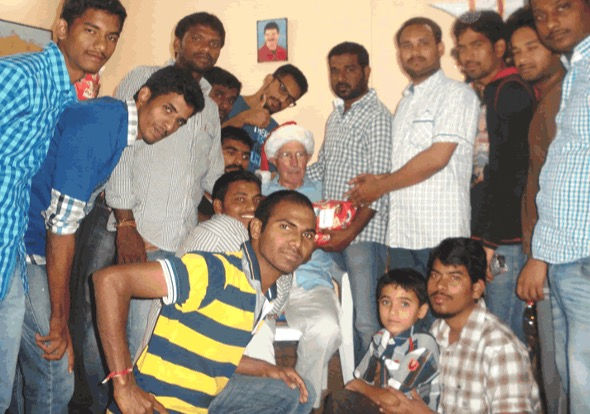
Indian Student Scholarship Graduates Celebrating Christmas
Northeast India 2013
INDIAN STUDENT SCHOLARSHIP PROGRAM
According to the Indian Government, education is crucial to the future of India and opportunities are limited, particularly in rural areas. In recognition of this need, the Indian Student Scholarship Program was developed by IGE, in 2003, to further the education of former Mucherla Global School students. It provided the North American equivalent of elementary, high school, college, and university education. Of the 40 students supported by the Program, all graduated with bachelor’s or master’s degrees in commerce, Business Administration, Engineering, Computing, Accounting, or Nursing.
Schools for individual students and their places of residence were selected based on proximity, quality, career choice, and cost. Each student signed an agreement that, upon completing their education and six months after obtaining employment, they would contribute 15% of their income to the Program for three years.
In addition to academic excellence, the Program operated like an extended family celebrating birthdays, reunions at Christmas, helping one another and developing a strong personal, social and environmental ethic. Day to day operations were guided by Dr. F. Richard Schneider, CEO of IGE, and Program Director, Sri Ram Challa, a graduate of the program with an MBA.
At the end of the conference, the participants formed the Meghalaya Global Peace Consortium. The Consortium’s vision is, “To contribute to the society where peace prevails, and individuals can realize their full potential by providing knowledge and skills needed to enable them to become global citizens”. Their goals include understanding the causes of conflict and empowering individuals and institutions to work for peace, with special focus on individuals, families, communities, and the environment.
As a result of the conference, IGE, the Indian State of Meghalaya and others in the Consortium are assisting communities to develop leadership skills; involve youth, women and minorities in governance; and improve community social and economic wellbeing. Dr. Serto is leading much of this work, both on the ground and through education of graduate students.
NORTHEAST INDIA EDUCATION
The most northeastern portion of India is connected to the rest of India by a narrow neck of land between Bhutan and Bangladesh and surrounded by Bhutan, China, Myanmar and Bangladesh. Many of the borders between northeast India and its neighbours are in dispute and, until recently, due to terrorism and other forms of violence, non-residents had to obtain permission to enter this forbidden zone.
In 2008, Dr. Leban Serto, IGE Board member and Coordinator of the Peace Studies Department at Martin Luther Christian University in Northeast India began exploring ways to support peace studies, conflict resolution and community development in Northeast India. In November of 2010, a consortium of people, actively engaged in promoting peace, from several parts of the world and various Northeast Indian states gathered in Shillong, the capital of Meghalaya state. They
explored various topics under the theme “Embracing Peace Education – Empowering the Individual, Institutions and Communities, Special focus on India”. Drs. Serto and Schneider were co-convenors and Sri Ram Ramulu, a graduate of IGE’s Indian Scholarship Program, facilitated a workshop

Sri Ram Challa at Education Forum
East India
The focus of this mission is on children, women, men, families, communities, and environment.
MGPC, 2010 will be a local, state, national and international effort to ensure full democratic, non-discriminatory, and vigorous participation. It will be an inclusive forum actively soliciting the best participation, advice, counsel, and resources, wherever they may be.
Further information about the consortium can be obtained from Dr. Leban Serto, Co-ordinator, Peace Studies Department, Martin Luther Christian University, Shillong- Meghalaya, India.
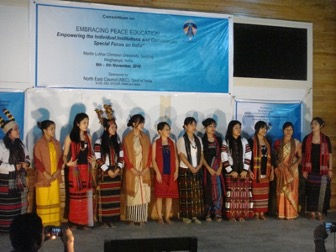
Meghalaya Global Peace Consortium
Northeast India 2010
MEGHALAYA GLOBAL PEACE CONSORTIUM
The Peace Consortium was formed in November of 2010 during the conference, Embracing Peace Education – Empowering the Individual, Institutions and Communities: Special focus on Indi. The conference was held on November 6-8, 2010, in Shillong, Meghalaya, which brought together a number of Governmental and non-governmental organizations from around the world.
The vision of the Consortium is, “To contribute to the society where peace prevails, and individuals can realize their full potential by providing knowledge and skills needed to enable them to become global citizens”.
To further this vision, the consortium adopted the following goals: “We aim to understand the causes of conflict and to empower individuals and institutions to embrace the belief and work toward that peace is possible. This can be achieved with partnership and collaboration and by working together in programs, designing educational curriculum projects and research.”
SAN JOSE, COSTA RICA CONFERENCE
San Jose, Costa Rica Conference
Focus on the Future: Empowering Agents of Change
March 3-4, 2014 – San Jose, Costa Rica
It is absolutely clear that dramatic changes in all dimensions of society (political, social, economic, and environmental) are imperative. IGE was joined in this effort by United Nations University for Peace (UPEACE) to host Focus on the Future: Empowering Agents of Change in San Jose, Costa Rica, March 3 and 4, 2014. This conference brought together change agents from around the world who want to make it a better place to live, to work and to be. They came from different sectors and generations and brought different issues, strategies, and points of view.
From presentations by successful social innovators and from participative processes, participants identified the needs of change agents and explored strategies to increase the effectiveness of efforts and actions. Participants learned about the huge numbers of change agents, around the world, who are working at local and global levels and are improving the world, one change at a time.
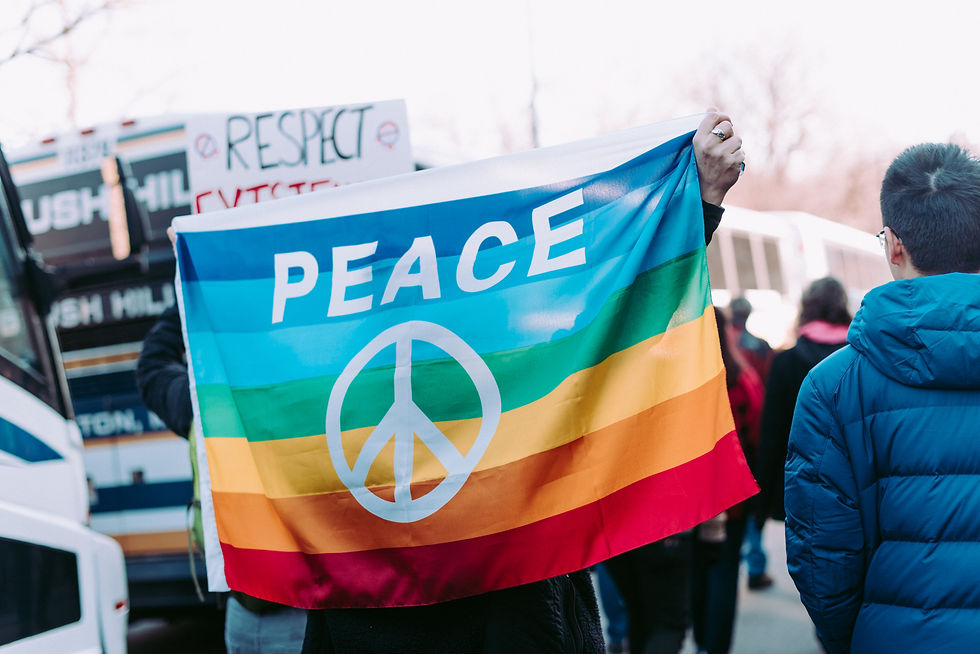
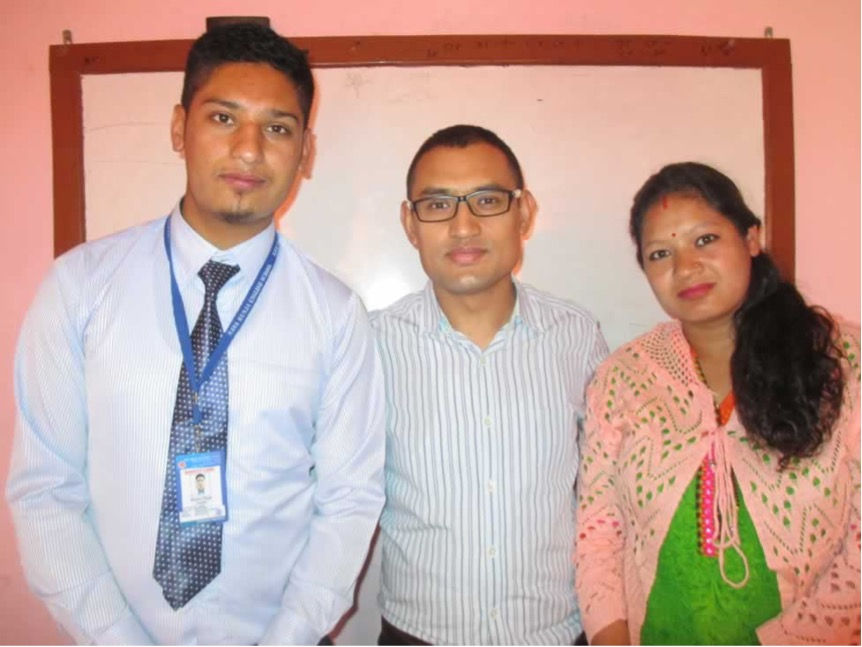
UNNAT Nepal Online Instructors
Kumar (Instructor), Amrish Thapa (President of UNNAT Nepal) and Menuka (Instructor)
NEPAL ONLINE EDUCATION PROJECT
IGE partnered with organizations and volunteers from the USA, Canada and Nepal to support a Pilot Project to deliver an English Online and Computer Literacy Educational Program in Kathmandu, Nepal. The project targeted marginalized youth and adults within Kathmandu and surrounding villages who currently had no access to education or the means to pay for it.
This educational initiative was in response to the pressing educational needs of Nepal since the major earthquake in 2015. It was our goal to help address poverty through education, increasing opportunities to access to employment, and support a better quality of life for the participants.
A team was put together with volunteers from Nepal and Canada to deliver an 8-week online course to teach English in 2016. Technical assistance was provided to support face to face interaction with the 12 students who participated. All the students successfully completed the program and IGE Directors Dorothy Argent, Wendy Schabrel and Sri Ram Challa personally presented the certificates of completion to the students on February 26, 2017, at the Paradise Self Study Centre in Kathmandu.
IGE PHOTOS
OUR GALLERY

Visiting United Nation During IGE Board Meeting
Debra Schneider, IGE Board Member

Broadcasting Life From RFPI
Radio for Peace International in Costa Rica

Picture of Mucherla Global Students
Mucherla Global School in India

Mucherla Global School
Northeast India
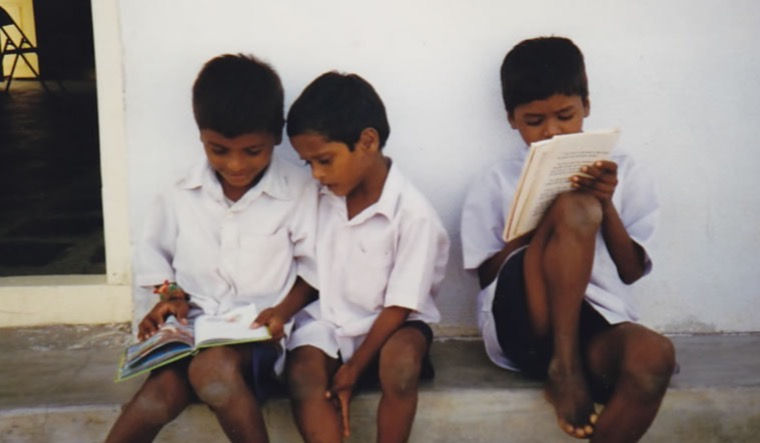
Reading Books Before School
Mucherla Global School

Ruth Schneider (Granny)
India
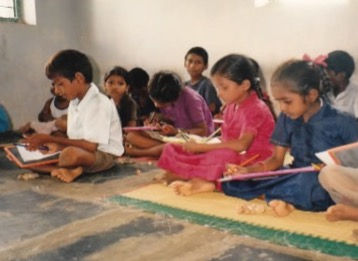
Drawing Pictures In School
Mucherla Global School in India

Class Performance
Mucherla Global School in India

Taking Care Of The Garden
Mucherla School in Indi

Planning Session in India with Graduates For Indian Student Scholarship Program

Ravi Reporting Results Back to Students
Indian Student Scholarship Program

Recognition Ceremony for Graduates
Khamman, India In 2018

Recognition Ceremony for Graduates
Khamman, India in 2018

Graduate Ummagani Nagesh with his wife Mettu Thanking Canadian Financial Sponsors for his Education at Recognition Ceremony

Andhra Pradesh Village Outreach

Andhra Pradesh Village Outreach

Indian Student Scholarship Graduates Celebrating Christmas
Northeast India In 2013

Sri Ram Challa at Education Forum
Northeast India Education

Meghalaya Global Peace Consortium
Northeast India In 2010

Meghalaya Global Peace Consortium
Northeast India In 2010

Neils Christiansen- Presented Gift
From Dr. Leban Serto
Manipur University, Imphal, Manipur, India

Presenting Certificate to graduate of Nepal Education English Program
Wendy Schrabrel - IGE Board Director

Kumar (Instructor), Amrish Thapa (President of UNNAT Nepal) and Menuka (Instructor)
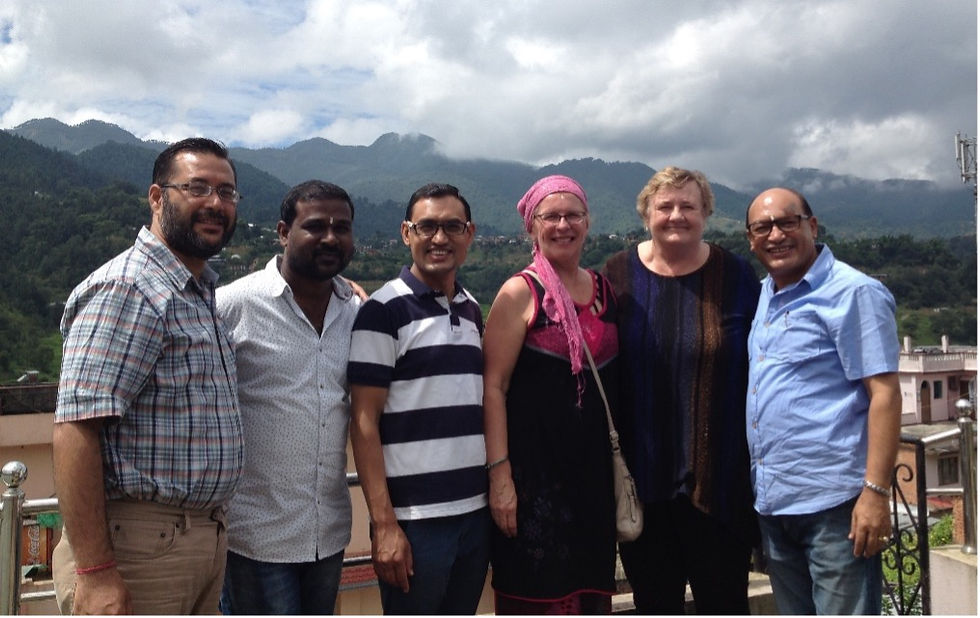
Visit to Nepal
Members of IGE and UNNAT Nepal Board

GET THE LATEST UPDATES & NEWS
